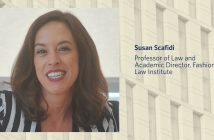Highlighting a key partner in the A2J Initiative at Fordham Law School
The pursuit of justice is the essential mission of the legal profession
I started my career as a lawyer at the Legal Aid Society in New York City, where I worked on issues of housing and homelessness. Through my work, I came to realize that the difference for a person between having and not having a home often boiled down to one simple fact: access to a good lawyer.
At Legal Aid, I was very fortunate to work with fantastic lawyers—creative, thoughtful, and passionate individuals who confronted cases with complex legal and human challenges and who proceeded almost uncannily to devise ingenious solutions that benefited clients. I was deeply impressed with the incredible difference my colleagues were able to make in people’s lives.
From that formative time, I took away a strong sense of what it means to be a great lawyer motivated by the ideal that everyone deserves justice. I also learned the critical responsibility that lawyers have to help fill our society’s tremendous gap in need. There are many great lawyers who do access-to-justice work—and many more are needed. All lawyers can and should play a role, as the pursuit of justice is the essential mission of the legal profession.
To further this mission, last year we launched the A2J Initiative at Fordham Law School. The initiative, and the work we are doing to fulfill its promise, define Fordham’s role in the global movement to realize the vital connection between law and justice. Through the A2J Initiative, we are pursuing efforts aligned with our tradition of service to others, and we will better integrate the excellent work done by our experiential education program, our superb scholars and journals, our centers and institutes, our student-led public service groups, and our additional projects that implicate access-to-justice concerns and are essential to our teaching and to our life as a community.
Our aim is to be a thought leader and incubator of innovative ideas, research, and action in making access to justice a reality rather than an aspiration. This objective reflects both Fordham Law’s long-standing values and my own deep beliefs in the effect that access to justice can have on the lives of those in need, and the power of our collective efforts to make an impact on this vital issue.
The ideal of justice is critical to building societies based on principles of fairness and freedom. It is an ideal that cannot be realized unless the principle of equal access is made an urgent priority. Because Fordham Law is so deeply engaged in achieving access to justice in so many ways, we will commit a regular column in this magazine to the subject. I am pleased to inaugurate this new section by highlighting the work of the National Center for Access to Justice, which arrived at Fordham Law in 2015.
– Matthew Diller
Across our country and around the world, millions of people lose their families, homes, safety, and sustenance each year because they cannot obtain a fair hearing from the legal system. When a tenant is intimidated into leaving an apartment, when a working person is denied pay that is rightfully due, when a parent suffers criminal violence at the hands of an abusive partner, or when a creditor demands payment on a debt not rightly owed, lives are shattered.
The absence of civil justice not only destabilizes communities and corrodes social bonds but also breeds contempt for the law itself. We can do more to assure that civil justice is within reach—saving homes, preserving jobs, securing the safety of family members, restoring public benefits that stave off hunger, and protecting family savings. Insisting on access to justice has additional impacts on helping secure fair treatment under the law for every person without regard to race, ethnicity, gender, sexual preference, disability, poverty, or other qualities and capacities.
We all have a stake in access to justice not only because we and those we love are likely to face legal problems in our lives, but also because the basic stability of our society requires equal justice for all.
– David Udell
The National Center for Access to Justice at Fordham Law (NCAJ), led by Executive Director David Udell, is a national nonprofit research and advocacy organization that relies on data to identify problems and realize solutions as a means of closing the justice gap. The Justice Index, the data-driven online resource created by NCAJ, received the American Bar Association’s 2017 Pro Bono Publico Award for its data-intensive use of carrot-and-stick incentives to improve state justice systems. The Justice Index is a ranking of the 50 U.S. states, Puerto Rico, and Washington, D.C., on the degree to which they have adopted best policies for access to justice.
“We all have a stake in access to justice not only because we and those we love are likely to face legal problems in our lives, but also because the basic stability of our society—of our rule of law and of our democratic institutions—requires equal justice for all,” says Udell, who serves as a co-director of Fordham’s A2J Initiative with Dean Matthew Diller and Jonathan Lippman, former chief judge of the New York Court of Appeals.
Changing Perspectives
Achieving equal justice means that people have not only the meaningful opportunity to be heard but also the ability to learn about their rights and assert them effectively in a neutral and nondiscriminatory process that determines facts, applies law, and enforces outcomes.
Crime and law enforcement have long constructed the paradigm in discussions about fairness and the law. But in recent years, civil justice has come to the fore. The access-to-justice movement in the United States, the emergence of a global research movement to document the scope and depth of the problem, the expanding national pro bono effort to protect people’s rights in the civil justice and immigration systems, and the wide notice gained by Matthew Desmond’s best-seller Evicted are all features of this trend, Udell noted. The United Nations, through its 2030 Sustainable Development Agenda, and the Organization for Economic Cooperation and Development, through its initiative to evaluate the business case for funding civil justice system reform initiatives, are also indicators of the growing commitment to understanding and solving the civil justice gap confronting individuals and communities in the United States and around the world.
Today’s civil access-to-justice movement can alternately be described as “growing, sprawling, atomized, uncoordinated, and under-theorized,” according to Udell. Fresh ideas and technological approaches are fueling progress on civil and criminal justice system reform, human rights and legal empowerment, and numerous social justice and civil access-to-justice fronts. Innovative tools, such as NCAJ’s Justice Index and the World Justice Project’s Rule of Law Index, rely on data and implement technology to map and present the problems, the solutions, and the implications, which deepens our understanding and fosters research and reform.
“The dynamism of the information revolution has disrupted the status quo and begun to change numerous aspects of civil justice systems; the field has now begun to catch fire,” Udell says.
Pointing to the Data
NCAJ at Fordham Law School is uniquely situated to seize this moment through its flagship project to create the Justice Index, as well as its work with courts, the bar, the academy, and other justice system stakeholders in the United States and in other countries. NCAJ’s role in Fordham Law School includes consulting with faculty members; hosting conferences and symposia; working with centers, institutes, and clinics; providing guidance to law students; and supporting pro bono projects.
The Justice Index is now in its fourth year of increasing public understanding of American courts, facilitating social science research, and supporting justice system reform. It has been widely covered in the media and consulted by countries intent on developing justice indices of their own. It is a product of a massive pro bono effort that involved pro bono lawyers from six firms, as well as statisticians, accountants, coders, and expert technicians at Deloitte.
With 120 indicators and 5,000 data points, the Justice Index makes it easy for users to see and understand the overall impact of access-to-justice policies by sorting its findings into four categories:
- The ratio of civil legal aid attorneys to people who are poor
- Policies to assist self-represented litigants
- Policies to assist people with limited English proficiency
- Policies to assist people with disabilities
Its focus on data illustrates in a clear and nonpartisan manner whether the policy environment in the states is fulfilling the states’ responsibilities to people facing language barriers, contending with disabilities, or living in marginalized and poor communities, for whom access to justice is often elusive.
“In an era when facts are questioned with ‘alternative facts,’ the Justice Index offers an objective measure of whether our nation’s commitment to equal justice is being honored,” Udell says.
The Year Ahead
The NCAJ will expand and build on its commitment to equal justice in numerous ways. Its planned projects include three major efforts.
- Reframing the Justice Index to highlight the common problems people face that require access to justice. “Our next step is to present a face through which anyone, knowledgeable or not about the justice system, can learn how access to justice can provide solutions to life problems,” Udell says. As examples, he cited keeping a home, reducing debt, maintaining family relationships, and securing safety from physical harm.
- Developing metrics for the access to justice movement to track and expand data on civil access to justice by helping nonprofits, philanthropies, and governments to implement the United Nation’s Sustainable Development Goal 16, which calls on all countries to “provide access to justice for all.”
- Educating the public on the need for civil access to justice to reduce mass incarceration by examining the link between civil legal aid and the criminal justice system. NCAJ has written about the need for civil justice system reform to support criminal justice reform, and it has hosted public events featuring chief justices of state courts debating the subject. Next, it will publish a series of articles and host a series of public events in collaboration with Fordham Law School on next frontiers in access to justice.





